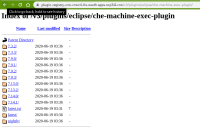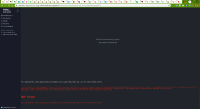-
Bug
-
Resolution: Done
-
Blocker
-
2.2.0.GA
There was start workspace error when install CRW from OperatorHub, or by using crwctl:
pulling image "quay.io/crw/pluginbroker-metadata-rhel8:latest" Successfully pulled image "quay.io/crw/pluginbroker-metadata-rhel8:latest" Created container Started container Starting plugin metadata broker Failed to download plugin meta: failed to fetch plugin meta.yaml from URL 'https://plugin-registry-mmusiien-crw-using-crwctl-oauth.apps.ocp311.crw/v3/plugins/eclipse/che-machine-exec-plugin/7.14.3/meta.yaml': Downloading https://plugin-registry-mmusiien-crw-using-crwctl-oauth.apps.ocp311.crw/v3/plugins/eclipse/che-machine-exec-plugin/7.14.3/meta.yaml failed. Status code 404. Response body: <!DOCTYPE HTML PUBLIC "-//IETF//DTD HTML 2.0//EN"> <html><head> <title>404 Not Found</title> </head><body> <h1>Not Found</h1> <p>The requested URL /v3/plugins/eclipse/che-machine-exec-plugin/7.14.3/meta.yaml was not found on this server.</p> </body></html> Error: Failed to run the workspace: "Plugins installation process failed. Error: Plugin brokering process for workspace workspacef2ydxwg8hici88zq failed with error: Failed to download plugin meta: failed to fetch plugin meta.yaml from URL 'https://plugin-registry-mmusiien-crw-using-crwctl-oauth.apps.ocp311.crw/v3/plugins/eclipse/che-machine-exec-plugin/7.14.3/meta.yaml': Downloading https://plugin-registry-mmusiien-crw-using-crwctl-oauth.apps.ocp311.crw/v3/plugins/eclipse/che-machine-exec-plugin/7.14.3/meta.yaml failed. Status code 404. Response body: <!DOCTYPE HTML PUBLIC "-//IETF//DTD HTML 2.0//EN"> <html><head> <title>404 Not Found</title> </head><body> <h1>Not Found</h1> <p>The requested URL /v3/plugins/eclipse/che-machine-exec-plugin/7.14.3/meta.yaml was not found on this server.</p> </body></html>
There was no 7.14.3 in plugin registry

-------------------------
Start of workspace from CRW 2.2.0.RC installed by the next command was successful:
crwctl server:start --che-operator-cr-yaml=/mnt/hudson_workspace/workspace/install-crw-using-crwctl/custom-resource.yaml --che-operator-image=quay.io/crw/crw-2-rhel8-operator:latest --listr-renderer=verbose -n crw-crwctl-tls-oauth
where custom-resource.yaml was the following:
custom-resource.yaml
# # Copyright (c) 2012-2019 Red Hat, Inc. # This program and the accompanying materials are made # available under the terms of the Eclipse Public License 2.0 # which is available at https://www.eclipse.org/legal/epl-2.0/ # # SPDX-License-Identifier: EPL-2.0 # # Contributors: # Red Hat, Inc. - initial API and implementation # CR is based on https://raw.githubusercontent.com/redhat-developer/codeready-workspaces-chectl/master/docs/custom-resource.yaml apiVersion: org.eclipse.che/v1 kind: CheCluster metadata: name: codeready-workspaces spec: server: # server image used in Che deployment cheImage: 'quay.io/crw/server-rhel8' # image pull policy used in Che deployment cheImageTag: 'latest' # image:tag used in Devfile registry deployment devfileRegistryImage: 'quay.io/crw/devfileregistry-rhel8:latest' # image:tag used in plugin registry deployment pluginRegistryImage: 'quay.io/crw/pluginregistry-rhel8:latest' # defaults to `che`. When set to `codeready`, CodeReady Workspaces is deployed # the difference is in images, labels, exec commands cheFlavor: 'codeready' # specifies a custom cluster role to user for the Che workspaces # Uses the default roles if left blank. cheWorkspaceClusterRole: '' # when set to true the operator will attempt to get a secret in OpenShift router namespace # to add it to Java trust store of Che server. Requires cluster-admin privileges for operator service account selfSignedCert: true # Name of the config-map with public certificates to add to Java trust store of the Che server. serverTrustStoreConfigMapName: '' gitSelfSignedCert: false # TLS mode for Che. Make sure you either have public cert, or set selfSignedCert to true tlsSupport: true # protocol+hostname of a proxy server. Automatically added as JAVA_OPTS and https(s)_proxy # to Che server and workspaces containers proxyURL: '' # port of a proxy server proxyPort: '' # username for a proxy server proxyUser: '' # password for a proxy user proxyPassword: '' # a list of non-proxy hosts. Use | as delimiter, eg localhost|my.host.com|123.42.12.32 nonProxyHosts: '' # sets mem request for server deployment. Defaults to 512Mi serverMemoryRequest: '' # sets mem limit for server deployment. Defaults to 1Gi serverMemoryLimit: '' # sets default namespace where new workspaces will be created workspaceNamespaceDefault: '' # defines if user is able to specify namespace different from the default allowUserDefinedWorkspaceNamespaces: false customCheProperties: CHE_LIMITS_USER_WORKSPACES_RUN_COUNT: '-1' CHE_WORKSPACE_AGENT_DEV_INACTIVE__STOP__TIMEOUT__MS: '900000' CHE_DOCKER_ALWAYS__PULL__IMAGE: 'true' CHE_WORKSPACE_PLUGIN__BROKER_METADATA_IMAGE: 'quay.io/crw/pluginbroker-metadata-rhel8:latest' CHE_WORKSPACE_PLUGIN__BROKER_ARTIFACTS_IMAGE: 'quay.io/crw/pluginbroker-artifacts-rhel8:latest' CHE_SERVER_SECURE__EXPOSER_JWTPROXY_IMAGE: 'quay.io/crw/jwtproxy-rhel8:latest' CHE_FACTORY_DEFAULT__EDITOR: 'eclipse/che-theia/latest' CHE_FACTORY_DEFAULT__PLUGINS: 'eclipse/che-machine-exec-plugin/latest' CHE_WORKSPACE_DEVFILE_DEFAULT__EDITOR: 'eclipse/che-theia/latest' CHE_WORKSPACE_DEVFILE_DEFAULT__EDITOR_PLUGINS: 'eclipse/che-machine-exec-plugin/latest' database: # when set to true, the operator skips deploying Postgres, and passes connection details of existing DB to Che server # otherwise a Postgres deployment is created externalDb: false # Postgres Database hostname that Che server uses to connect to. Defaults to postgres chePostgresHostName: '' # Postgres Database port that Che server uses to connect to. Defaults to 5432 chePostgresPort: '' # Postgres user that Che server when making a db connection. Defaults to pgche chePostgresUser: '' # password of a postgres user. Auto-generated when left blank chePostgresPassword: '' # Postgres database name that Che server uses to connect to. Defaults to dbche chePostgresDb: '' # Postgres deployment in format image:tag. Defaults to registry.redhat.io/rhscl/postgresql-96-rhel7 (see pkg/deploy/defaults.go for latest tag) postgresImage: '' storage: # persistent volume claim strategy for Che server. Can be common (all workspaces PVCs in one volume), # per-workspace (one PVC per workspace for all declared volumes) and unique (one PVC per declared volume). Defaults to common pvcStrategy: 'per-workspace' # size of a persistent volume claim for workspaces. Defaults to 1Gi pvcClaimSize: '1Gi' # instruct Che server to launch a special pod to precreate a subpath in a PV preCreateSubPaths: true # image:tag for preCreateSubPaths jobs pvcJobsImage: '' # keep blank unless you need to use a non default storage class for Postgres PVC postgresPVCStorageClassName: '' # keep blank unless you need to use a non default storage class for workspace PVC(s) workspacePVCStorageClassName: '' auth: # instructs operator on whether or not to deploy Keycloak/RH SSO instance. When set to true provision connection details externalIdentityProvider: false # retrieved from respective route/ingress unless explicitly specified in CR (when ExternalKeycloak is true) identityProviderURL: '' # password for keycloak database user. Auto generated if left blank keycloakPostgresPassword: '' # desired admin username of Keycloak admin user (applicable only when externalIdentityProvider is false) identityProviderAdminUserName: 'admin' # desired password of Keycloak admin user (applicable only when externalIdentityProvider is false) identityProviderPassword: 'admin' # name of a keycloak realm. This realm will be created, when externalIdentityProvider is true, otherwise passed to Che server identityProviderRealm: '' # id of a keycloak client. This client will be created, when externalIdentityProvider is false, otherwise passed to Che server identityProviderClientId: '' # instructs an Operator to enable OpenShift v3 identity provider in Keycloak, # as well as create respective oAuthClient and configure Che configMap accordingly openShiftoAuth: true # name of oAuthClient used in OpenShift v3 identity provider in Keycloak realm. Auto generated if left blank oAuthClientName: '' # secret used in oAuthClient. Auto generated if left blank oAuthSecret: '' # image:tag used in Keycloak deployment identityProviderImage: '' metrics: # Enables '/metrics' endpoint of Che server. enable: false
- is related to
-
CRW-994 Add build-time verification that che.version version of che-machine-exec and che-theia exist exist in plugin registry
-
- Closed
-
